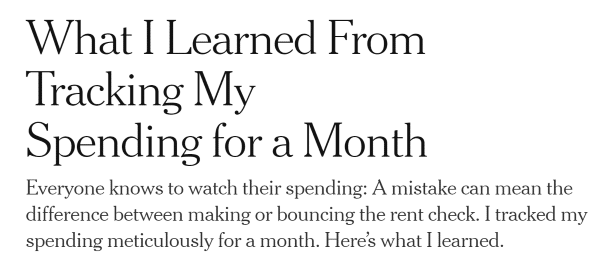I know that things that are obvious to some aren’t obvious to others. The phrase “it’s easy once you know how to do it” is both banal, profound, and very relevant.
That said, when someone writes an article about something that I’ve been writing about for years, and touts the revelations that I’ve been touting for as long, I think it counts as interesting.
With that in mind, I want to discuss a recent New York Times article by a woman who decided to track her spending for a month.

I’ll summarize some of the basic points. The author is, incidentally, a published author on money, so both she and I figured that this would be well-trodden ground for her.
But no, this was new:
“I figured I already had a pretty good idea of what my spending looked like. It’s not like I’m some shopaholic who can’t walk past a J. Crew without whipping out a credit card, and I know enough about my expenses to know when I have enough to pay the bills, and when I’m in trouble.”
But while that’s a good baseline, that knowledge is much too passive. As she found out:
“In the previous three months, I’d spent a whopping $636 on Amazon alone. And what did I have to show for it? According to my purchase history, a few travel books, some shoes and a water pick.”
What are the chances that she has Amazon Prime? Raise your hand if you think it’s 100%?
And “a few” travel books? “Some” shoes? How much was that water pick?

Now, I have no truck with the amount. Assuming you have $636 to spend on shoes, books, and water picks, I say go for it. Spend money on things that bring you joy. Just know you’re spending it.
Choice quotes
Here are some more words of wisdom that I’ve been going on about for years:
“The simple chore of writing down every purchase, physically, with pen and paper, forced me to think before buying.”
Putting barriers in place to prevent spending is a good thing. I have a rule that if the purchase is over $50 or so and I wasn’t planning on making it, I wait 24-48 hours before doing it. If I’m still thinking about it, then I go and do it. (But sometimes, once the moment passes, you realize that it just wasn’t a big deal.)
And if you have to write it down, it’s a little bit of a deterrent. The paper (or spreadsheet or document on your phone) is your accountability partner. You can’t lie to it (well you can, but what’s the point?) It will stare back at you, as if to say, “you really spent this much on that??”
“When I wanted to buy a fancy, leather-bound journal that I definitely didn’t need, I found myself justifying it this way: ‘It’s just $20, not even worth the time overthinking it. Just buy it!'”
Maybe I should reduce my $50 limit up there. The author referred to the tendency to have a minimum don’t-think-about-it amount for spending. I wonder if it’s a good idea to have a blanket minimum purchase arrangement.
Perhaps instead, you have a minimum amount for each of a certain type of purchase. For example, back when I earned an hourly wage, I always said that I would buy no lunch that cost more than an hour’s wage. Thoughtless spending can add up.
“When you’re more conscious with your spending, you might be surprised at how much more room you can create in your budget.”
Wow, it’s so hard to resist the urge so say: Duh.
I’ve written about this so many times. When you track your spending, you will feel like you’ve gotten a raise. I’ve seen hundreds of dollars magically appear in a budget with “no wiggle room”. You might not be ready to track your spending, and that’s okay, but just know that you’re leaving a lot of money on the table.
“I used an old-fashioned pen and paper and a notebook when I tracked my spending. It was a little less convenient than an app, but it seemed to make me more connected to the exercise.”
I use a spreadsheet, personally, though paper works just as well. The point about not using an app is significant, in that anything that makes this process easier disconnects you from its benefits. You want more friction, not less.
“It’s not an exercise you have to keep up with forever, but tracking is a good way to reset your spending habits and make sure you’re aware of how you spend.”
And here’s where I disagree. If awareness is a good thing, then what benefit could there be to ceasing it? Wouldn’t that eventually take you right back to where you started?
No, I strongly suggest that you track your spending this month, next month, and every month from now on. There is no point in your life when this won’t be valuable. When you make very little, every dollar counts. When you make a lot, you want to make sure you’re using it in line with your principles.
I know it’s tempting to let people off the hook and say that this is just an exercise you do once and then stop. And certainly, tracking for one month is better than tracking for zero months.
[perfectpullquote align=”full” bordertop=”false” cite=”” link=”” color=”” class=”” size=””]Spend money on things that bring you joy. Just know you’re spending it.[/perfectpullquote]
But the benefits of tracking persist well into the future. Otherwise, you might find yourself with a lot more water picks.


